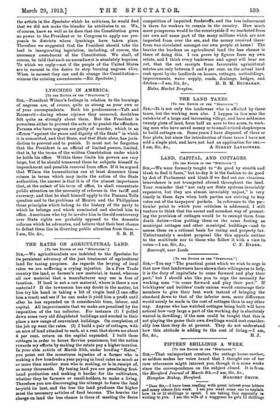LYNCHING IN AMERICA.
[To THE EDITOR OF THE SPECTATOR.']
SIR,—President Wilson's feelings in relation to the burnings of negroes are, of course, quite as strong as your own or of your correspondents. Both his predecessors—Taft and Roosevelt—during whose regimes they occurred, doubtless felt quite as strongly about them. But the President is powerless either to prevent the acts or to punish the offenders. Persons who burn negroes are guilty of murder, which is an offence "against the peace and dignity of the State" in which it is committed, and that State, and that State alone, has juris- diction to prevent and to punish. It must not be forgotten that the President is an official of limited powers, limited, that is, by the terms of the written Constitution under which he holds his office. Within those limits his powers are very large, but if he should transcend them he subjects himself to impeachment and possible removal from office. If it be argued that Wilson the humanitarian can at least d,enounce these crimes in terms which may incite the action of the State authorities, the answer is that it is of the utmost importance that, at the outset of his term of office, he shall concentrate public attention on the necessity of reforms in the tariff and currency, and that he shall himself apply to the Panama Tolls question and to the problems of Mexico and the Philippines those principles which belong to the history of the party to which he belongs and which nominated and elected him to office. Americans who try to involve him in the old controversy over State rights are probably opposed to the domestic reforms which he advocates, and believe that their best chance to defeat them lies in diverting public attention from them.—










































 Previous page
Previous page